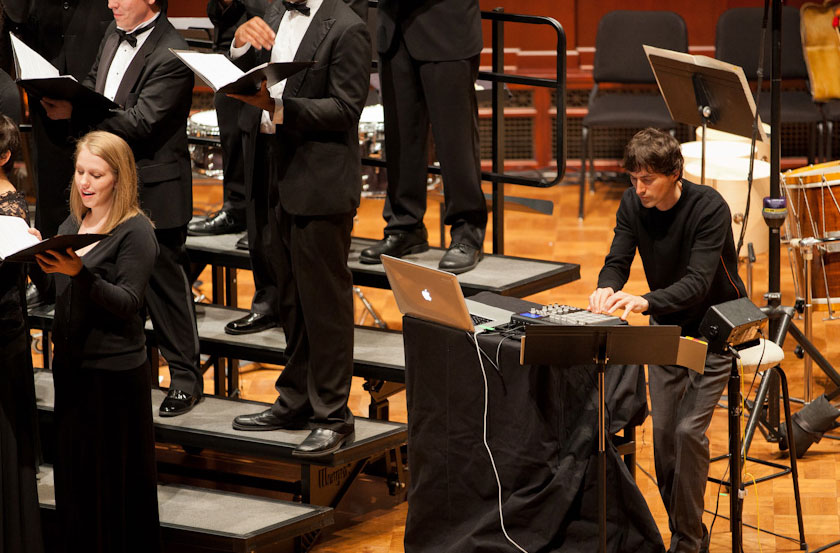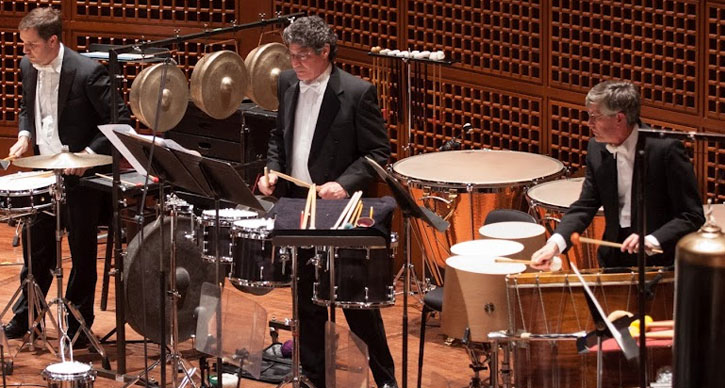On Mason Bates’ Alternative Energy
Photo: Mason Bates (right) performs Mass Transmission during last year’s San Francisco Symphony American Mavericks festival. His Alternative Energy will be performed by the Chicago Symphony Orchestra on September 27 at Hill Auditorium.
Photo by Mark Gjukich Photography.
Perhaps you’ve heard Mason Bates’ name, perhaps you’ve seen his picture; maybe you know he’s young, widely performed, broadly heralded and highly esteemed.
Neither Mason Bates nor his music reiterates the style or sentiment or personality of the goliaths of American Music who now enjoy the autumn of their careers and whose influence will begin, if not continue, to wane as more and more younger composers begin to assert themselves in American contemporary music. Yes, Mason Bates is part of a sea change because his music demands orchestras to expand their horizons, and because it brings sounds one would never associate with classical music into the concert hall. Alternative Energy is a fantastic example of this fact.
It is well known Mason Bates carries on two musical lives – one as a jet-setting, highly sought-after composer of concert music, and another as a DJ, deep to his elbows in club music and other forms of electronica. Clearly, his creativity sits in between these two musical worlds, because the fingerprint of electronic dance music is almost always perceptible in his more traditional pieces.
Alternative Energy deliberately does not hide its electronic sounds, nor does it shy away from the clarity and kineticism of dubstep and other kinds of dance music. The work compellingly uses the orchestra and electronics to depict the story of American industry’s past, present and future; and, though the piece does not pander, it is undeniably accessible. This is Mason Bates’ secret ingredient: he presents unusual sounds in a welcoming manner.
Video: Violinist Gloria Justen goes toe-to-toe with Mason Bates (DJ Masonic) as he spins for a Mercury Soul event at Mezzanine in San Francisco.
We’ll call this a, “combination of individuality and populism”, and this sentiment lies at the heart of the trend in American composing for which Mason Bates is, already, an elder statesman. All across the country, composers much younger than he are similarly embracing their roots in various types of popular music and incorporating those sounds into their music more boldly, more unapologetically and more ubiquitously than any other generation.
Believe it or not, this kind of eclecticism has typified American music from its beginning – after all, our national anthem borrows a tune from a popular 18th century British drinking song. After decades of esotericism, experimentation and conservatism, maybe American composers are, at last, armed with the experience and gumption to synthesize, from the elements of our culture, a music that clearly reflects and connects their unique identity and the larger world.
Alternative Energy explores and enhances the dynamic range of the orchestra like never before – and if it is any indication for how American music will evolve in the next decade or so, we can all be assured of a diversely influenced and consistently exciting future of heartening concert music, orchestral and otherwise, in this country.
First “Mavericks” – Guest Blog by Leslie Stainton
Photo: The SFS percussion performing in Lou Harrison’s Concerto for Organ and Percussion Orchestra as part of the Opening Concert of the American Mavericks Festival in San Francisco. (l-r James Lee Wyatt, Artie Storch, Tom Hemphill) Credit: Kristen Loken.
Editor’s Note: Lobby contributor Leslie Stainton will guest blog the San Francisco Symphony American Mavericks festival throughout this weekend.
For starters, there was the matter of dress: instead of 19th-century penguin suits, the men in the SF Symphony’s opening American Mavericks concert last night wore casual black pants and open-collared black shirts. You could feel their pleasure. That pleasure turned into radiant joy as the evening progressed, and the musicians worked their way through the bracing, at times tempestuous, at times haunting music of Copland, Cowell, Lou Harrison, and the young, Philadelphia-born Mason Bates, who performed onstage in his own evocative “Mass Transmission,” which had its world premiere last week in San Francisco.
Even if you think you hate this stuff—and for those who chafe at dissonance, there was plenty to hate—last night’s concert was a marvel. If only for the chance to see oxygen tanks take a percussive pounding center-stage. If only for the chance to hear Hill’s glorious organ get a workout the likes of which might have made Bach’s jaw drop. If only for the sheer delight of watching pianist Jeremy Denk slam his body into a Steinway again and again and come up beaming.
If only for the brief and almost gossipy talks Michael Tilson Thomas gave before each work on the program. Thomas not only knows these pieces but knew the composers and told stories about each, so as you listened to the works you could picture old Henry Cowell hanging out with an Irish cult in the woods north of San Francisco or Lou Harrison proudly driving one of the Bay Area’s first cars to run on leftover restaurant grease.
A few highlights:
7:17 pm
As the orchestra tunes up onstage—no happy trills here, but rather discordant tones, squeaks, mournful bleats—I read with admiration a short program note by co-sponsor Maxine Frankel, who says she and her husband helped fund these concerts to ensure that UMS “has the flexibility to consider the new, the different, the innovative, and the cutting-edge.” In a country whose public schools are slashing arts education, we desperately need this kind of thinking. Thank you, Frankels.
7:35 pm
Michael Tilson Thomas takes the stage. “What does it mean to be a maverick?” he asks. The next four nights will help shape answers.
7:48 pm
Midway through Copland’s “Orchestral Variations,” percussionists are snapping their fingers. My husband and I look at each other and grin. “This is so refreshing,” he says to me later. “The array of different sounds.”
7:55 pm
Introducing Henry Cowell’s “Piano Concerto,” MTT (as orchestra members call him) speaks of the composer as a Bay Area “maverist” famous for “vast splodges of notes.” Thomas says we can expect to hear traces of Cowell’s prodigious knowledge as an ethnomusicologist—and we do.
7:58 pm
The opening notes of Cowell’s concerto sound like cars in traffic. But then: surprising beauty. I feel for a moment as if I’m at a cocktail party with someone rippling the piano in the background. Jeremy Denk’s face is a wonder: he grimaces, shakes his jowels, heaves his body into the keyboard.
8:06 pm
The piano as machine gun.
8:10 pm
Denk convulses. He’s playing impossibly fast. Chopsticks on speed.
8:14 pm
Utter cacophony suddenly and bewilderingly culminates in an almost kitschy Hollywood ending. We’re done. The audience erupts. My friend Jim Kister, who’s sitting two rows in front of us, and whose musical tastes run to the conventional, takes his time applauding. During intermission I ask him what he thought:
8:28 pm
I ask one of the ushers how she liked the first half. “It’s unique,” she says, tight-lipped. And then: “I’m anxious to see what they do with the oxygen tanks.” She means the string of big tanks parked downstage left, which have yet to be used. There are also big wooden drums, suspended gongs, chimes, a celesta.
8:40 pm
The U-M Chamber Choir takes the stage for Mason Bates’s “Mass Transmission.” Shouts of recognition from friends in the crowd. Bates himself looks like a college kid—skinny, dressed in a pullover and jeans, I think. He’ll function like a DJ on what he calls “electronica”—digital samplings and techno beats.
8:57 pm
This piece is gorgeous. Consonant, accessible. “Maverick” doesn’t have to be ugly, I realize. I didn’t expect to be moved to tears tonight, but Bates achieves it with his lyrical rumination on communication, technology, and the love between a mother and her daughter. Earlier he’s described this piece, about one of the world’s first long-distance communications initiatives, as “basically a story of skyping in 1920.”
9:04 pm
An ethereal ending—tones just drift off, and we’re left to contemplate the (presumably now-dead) real-life mother and child at the heart of this piece, and the way we live today vs. the miracle of this kind of communication nearly a century ago. How clever of Bates to use new technology to simulate and suggest the old. And through it all, the power of the human voice (which Bates says represents “the most beautiful animal warmth we have.”)
9:11 pm
MTT introduces the last piece, Lou Harrison’s “Concerto for Organ with Percussion Orchestra.” The stage is stripped away—just the organ and an array of often bizarre instruments (rasps, rattles, plumber’s pipes …). I’m reminded of the friend who refers to the percussion section as “the toy department.” MTT says, “This concerto represents Harrison’s extraordinary view of the musical world.” It’s got the rhythmic drive of the gamelan, of Africa, hints of 12-tone music, Middle Eastern vocal traditions.
9:20 pm
I’m hearing echoes of “Einstein on the Beach” in the organ’s runs. UMS has truly bookended its Renegade series.
9:25 pm
Medieval sounds. Beauty I didn’t expect.
9:31 pm
More echoes of “Einstein.” Was Glass a disciple of Harrison?
9:40 pm
A rousing evenings ends in a burst of percussive battering that folds into the eloquent ring of a suspended gong. Long fade to silence, and then again, the audience is on its feet. Earlier another friend I’d spotted in the audience told me, “I had a cup of coffee beforehand, because I thought I might have trouble staying awake, but it’s the last thing I needed.
Afterward, I run into Mona DeQuis and a colleague from the DSO shop, who are selling CDs in the lobby. We talk about the evening’s music:
DJ Chrome Sparks interviews composer/DJ Mason Bates
Mason Bates will be in Ann Arbor on March 22 as part of San Francisco Symphony American Mavericks festival.




